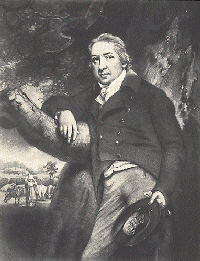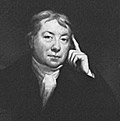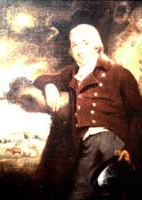 |
When choosing a hero, one has to think very carefully and search throughout the depths of their mind. Sometimes it is not what one’s hero has accomplished one admires, but rather it is the hero’s feelings and traits that one prefers over others. Also, it is important how they accomplished things, with what methods they used and such. For example, some may prefer things done with words instead of force. These are all the steps I had to take to find out what my hero would be like. I found that one who was a leader made for a respectable hero. Also, he or she needed to be a good problem solver and needed to overcome scientific or political issues or boundaries in their lifetime. He or she had to be productive, beneficial, and a quick thinker. Thusly, my hero would have to be a great inspiration to a person interested in the field of science or arithmetic. Whatever my hero strove for, it had to be something that could help the world work towards a beneficial future.
Dr. Edward Jenner was born in the town of Berkeley, Gloucestershire of England on the 17th of May, 1749. He lived through a tragic childhood, for at the age of five both of his parents passed away. Jenner was raised by his sister, who was to marry the soon-to-be vicar Reverend G. C. Black (Jenner’s father had been the vicar of Berkeley before he passed). While growing up, Jenner expressed a high amount of interest towards rural topics and country matters. He often visited the Severn River to collect shells and anything else that caught his eye. As he grew older, this simple interest blossomed into a thirst for medical and basic scientific study. He was inoculated to smallpox in his preteens, pushing his medical interest even further. After being schooled in Wotton-under-Edge and Cirencester, he became an apprentice to the wise Dr. Daniel Ludlow. Through Ludlow, he gained the initial experience needed to be a surgeon. But later, in 1770, he moved to London, seeking the famous John Hunter, an excellent surgeon and experimentalist. He quickly developed a strong relationship with Hunter as he and Jenner became very good friends amongst the study of the human anatomy and medical sciences. After three years of training under Hunter, Jenner moved back to Berkeley and became the local practitioner and surgeon, which was very convenient to the townspeople and ill travelers.
 |
As a general practitioner, he faced many illnesses and patients, and his doctoring proved very effective against their ailments. He would always do his best to aid another. Once, he even braved a blizzard to get to a very sick patient and nearly lost his life due to over-exposure. He also made a very productive surgeon and saved many lives. In addition to doctoring, he still had much interest in geology, specifically fossils. Despite his huge medical career, he made a dynamic find in uncovering the remains of a Plesiosaur, a prehistoric dinosaur. His thoughts of geology expanded more and more until his main interests were doctoring and geology. His extra-curricular thoughts were always an inspiration to others, triggering many geological and fossil-related finds and discoveries. Jenner achieved many things, such as his study of the cuckoo bird and his eventual acceptance into the Royal Society, making him a “Fellow” of the Royal Society. But, his greatest achievement is that of the vaccination of smallpox and the later eradication of the disease itself.
Smallpox is a disease triggered by the viral strain variola. It enters the body through the lungs and is carried in the blood to the internal organs, which the virus periodically infects. Later in the sequence, the virus spreads to the skin, which breaks out in a hideous rash. It is characterized by several symptoms: fever, headache, backache, and vomiting (twelve days after exposure). In less serious cases, the rash occurs, starting out small, then the pustules grow larger until they are intensified blisters, then they retreat and leave deep scars in the victims skin. In more sever cases (much more common) the victim usually dies of internal bleeding or more secondary infections. It was a very common disease in different eras, climbing to “epidemic” class over time. It was extremely contagious and deadly, and most cities frantically searched for a cure or prevention. In this frantic search, Jenner began his quest for the cure of smallpox. It started with Jenner giving common inoculations (specifically called variolations for the specific strain of the smallpox virus, hence variola). By drawing blood from his patients and deliberately giving them smallpox under the right body conditions, the patients were quarantined in stables and therefore gave their systems a chance to develop immunity. With the process being very brutal, and sometimes fatal, Jenner strived for a more efficient and safe method. This led him to using cowpox as a solution. He discovered cowpox, a mild viral infection of bovines, which was a simpler strain of variola. This virus merely caused outbreaks on the hands instead of the gruesome rash and such, therefore was safer to use on patients and more effective, giving the body a better chance to overcome this weak virus and build up an immunity to the strain. He called this process vaccination, after the Latin word vacca meaning “from a cow”. Some protested against his method and refused to be vaccinated, mostly because some thought the “white man” were the ones who made the disease the problem in the first place. But, Jenner’s innovative method eventually put an end to the epidemic of smallpox once and for all, even though very mild cases still occur.
 |
Jenner’s work was so fantastic, that hundreds of thousands of people admired him for his discovery, as well as many prominent societies and colleges. Even during the war between Britain and France, the great Napoleon, when Jenner asked him to release some British prisoners of war, replied, “Ah, Jenner, I can refuse him nothing.” Napoleon, being an enemy of Jenner’s country, even minted him a specialized medal commemorating him for his solution to the smallpox issues. In his time, Jenner became a significant leader in the field of science, inspiring many to expand their ideas. I also think it was admirable of him to have extracurricular studies of geology and birds, specifically the cuckoo. His leadership is what I admire him for mostly, but there are many other things. By excelling in productivity and quick thinking, he accomplished the unthinkable by creating a vaccination for smallpox, proving highly beneficial to society. Think of what the world would be like with the smallpox virus untamed. People would still be isolating or even burning corpses, being extra careful of contact with others, and basically just fearing infection of smallpox every moment of their lives. We owe Jenner so much for his leadership, productivity, and his quick thinking, and I am proud to admire him as my true hero.
Page created on 4/15/2003 12:00:00 AM
Last edited 1/9/2017 9:52:14 PM
